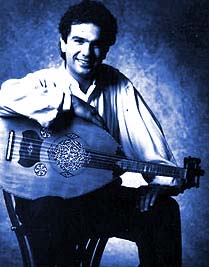|
|
Der Musiker Rabih Abou-Khalil
He recorded his first flute album in 1982, but soon abandoned it in favor of the oud, the most widely used instrument in the Arab world. The modern instrument looks like a European lute, and the Greek bazouki, but has a shorter neck. It has five to six double strings made of nylon or the more traditional, gut (Darm). Through Arab Spain the oud found its way into the rest of Europe in the eleventh century, where it developed into the lute and then into the guitar. The European names given to the lute, luth, Laute, Alauda etc. all have their origin in the Arab word for it (with article) Al-Oud. Just like the piano in Western music, so is the oud the composition instrument of Arabic music. There is hardly a composer in the Arab World who is not at the same time an excellent oud player.
The integration of foreign cultural phenomena should be a two-way process. Rabih Abou-Khalil says, “However, music of the First World is much less foreign to the Third World than vice versa, because it was forced upon it, and the people there believed that if they want to be respected they must try to emulate it.“ In Middle Eastern music we have three kind of musicians: first there are musicians who disassociate themselves completely from tradition by embracing Western music, secondly there are „self-appointed custodians of classical Arabic music“, these are fundamentalists who enjoy the sympathies of Western musicologists who believe that Arabic music should sound like it did two, three or four centuries ago. Finally there are musicians like Rabih Abou-Khalil and Simon Shaheen (living in the US) who move between two, three or more cultures and bring diversity and color to a world that is increasingly becoming multicultural. Rabih Abou Khalil has long been a commuter between cultures. His albums are a meeting point and a melting pot for musicians from the Arab World, Asia, Europe, USA, and Latin America. He always puts a cosmopolitan, multicultural group together and walks with them the thin line between jazz and traditional Arabic styles. His compositions are based on traditional Arabic rhythms, some dating back centuries. But the sound is jazzy and fresh. „His Western collaborators (who include Sonny Fortune, Glen Moore, Charlie Mariano, Glen Velez, Kenny Wheeler, Milton Cardona, Steve Swallow, et al. never give the impression of fulfilling a cultural duty, of being ordered off, as it were, to missionary work in the Arabian desert.“ (Die Weltwoche, Zürich) „The enthusiasm and intensity of their collective playing is infectious and, at the same time makes a lot of musical sense.“ (Frankfurter Allgemeine Zeitung) Rabih Abou Khalil amazing knowledge of Arabic and Western music helps him in building bridges between East and West. On one of his latest albums cover you can read the following sentence: „Nowadays, the formerly distinctive boundaries between cultures are slowly crumbling. The media has shrunk the world to a global village ... „ In times, he hopes the Third World will develop a greater sense of pride in its own traditions and that industrialized countries will accept music from other parts of the world as more than just a curiosity and not to be limited to „superficial fascination“. RABIH ABOU KHALIL believes in what he is doing to be a big contribution to growing multiculturalism in Germany. In a recent interview, he said that ”music really is multi-cultural. I am trying to build an intersection on a dead-end street. And I am convinced that every street can be extended.“ Discography
|
|||||||



 Born in Beirut (Lebanon) in 1957, he spent his youth in the cosmopolitan
climate of the sixties and early seventies. While living in Beirut,
he studied at the Beirut conservatory under the guidance of oud virtuoso
Georges Farah and flute with Josef Severa, first flutist with the
Prague Philharmonic Orchestra. In Beirut he listened to rock music
and jazz. He owned records by Thelonius Monk, Frank Zappa and Ella
Fitzgerald. In 1978 he fled the civil war and came to Munich to study
classical flute. He is married to a German woman, who was born in
Slovenia. Their two children are bilingual and multicultural.
Born in Beirut (Lebanon) in 1957, he spent his youth in the cosmopolitan
climate of the sixties and early seventies. While living in Beirut,
he studied at the Beirut conservatory under the guidance of oud virtuoso
Georges Farah and flute with Josef Severa, first flutist with the
Prague Philharmonic Orchestra. In Beirut he listened to rock music
and jazz. He owned records by Thelonius Monk, Frank Zappa and Ella
Fitzgerald. In 1978 he fled the civil war and came to Munich to study
classical flute. He is married to a German woman, who was born in
Slovenia. Their two children are bilingual and multicultural. In an interview, Abou-Khalil
said „I had the typical Third
World complex when I came to Germany and thought nobody would want
to listen to the oud. But soon I realized that I could express myself
a lot better on the oud, more naturally and with more ease, and found
that people here are more interested in hearing Arabic music than
in listening to just another non-European classical flute.
In an interview, Abou-Khalil
said „I had the typical Third
World complex when I came to Germany and thought nobody would want
to listen to the oud. But soon I realized that I could express myself
a lot better on the oud, more naturally and with more ease, and found
that people here are more interested in hearing Arabic music than
in listening to just another non-European classical flute.